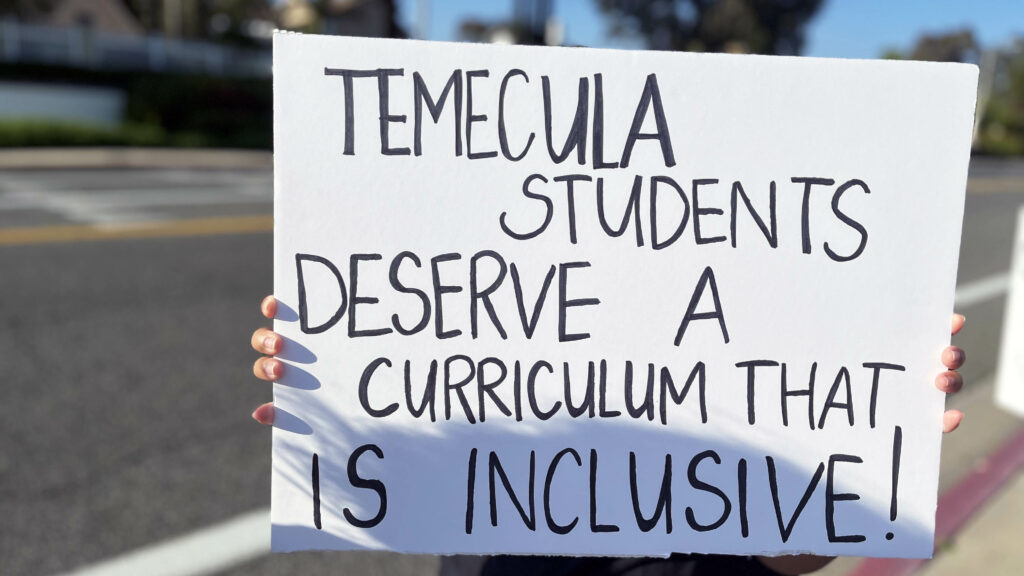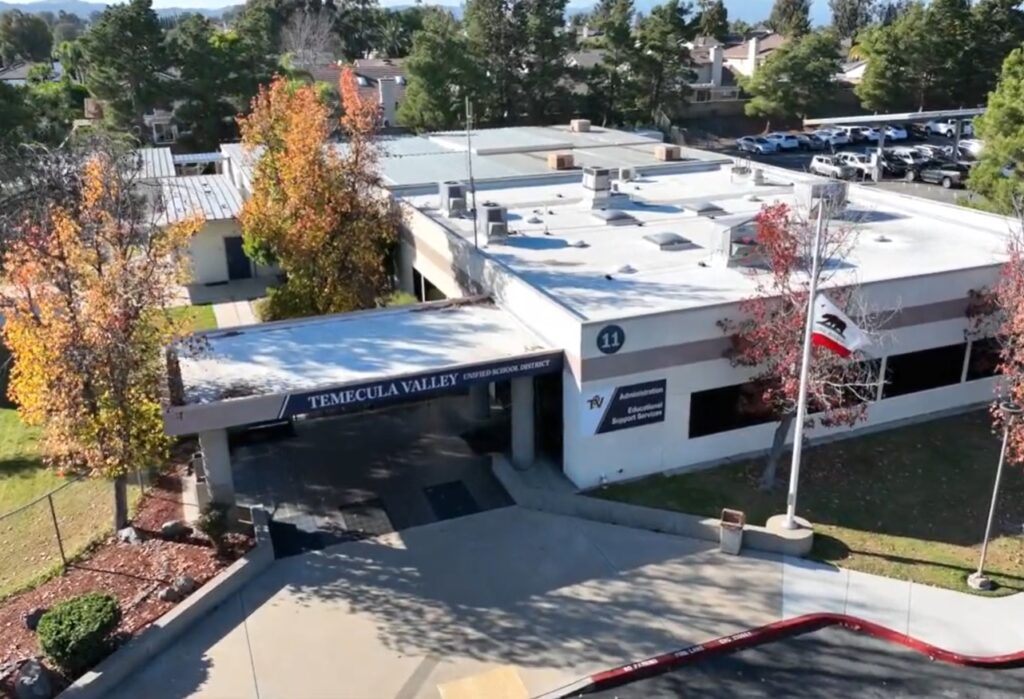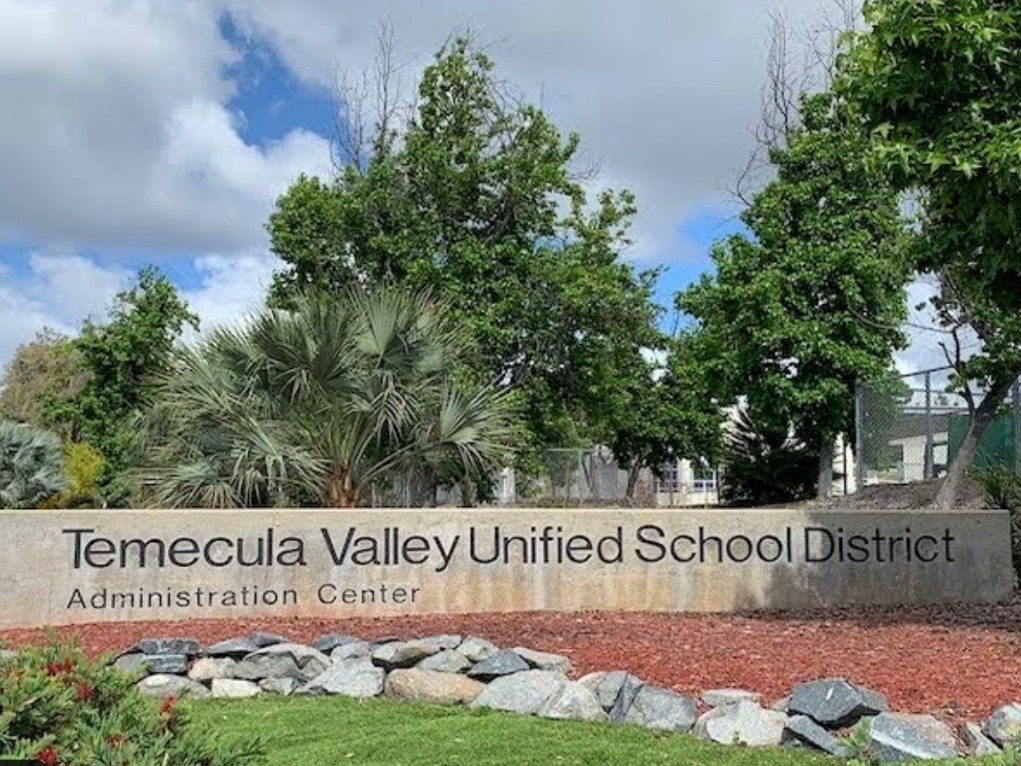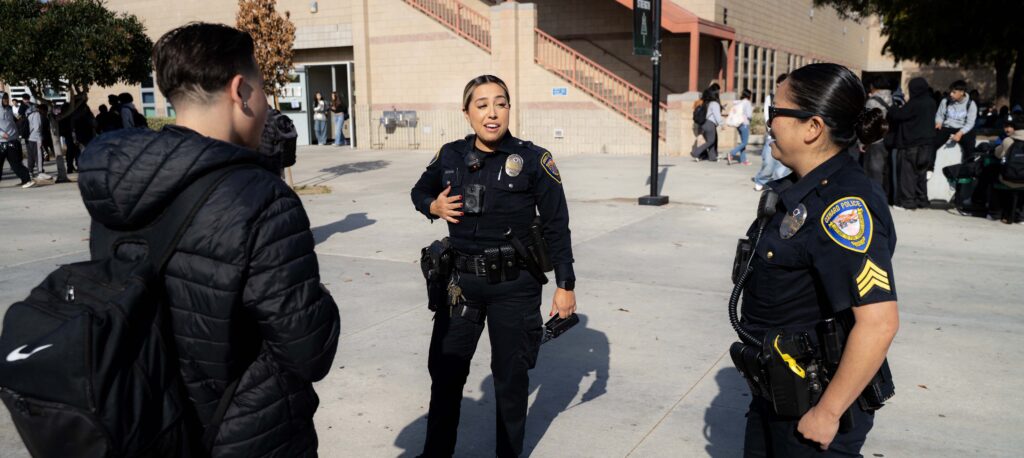
Community member Kayla Church stands in support of LGBTQ+ community and in opposition to Temecula Valley Unified curriculum ban.
Credit: Mallika Seshadri / EdSource
While litigation moves forward, the Temecula Valley Unified District can keep enforcing its transgender notification policy as well as its ban on critical race theory, which restricts instruction on race and gender more broadly, Riverside County Judge Eric A. Keen ruled Friday.
In what seemed to be a contradiction to this decision, Keen had ruled on Feb. 15 that the case — Mae M. v. Komrosky — filed on behalf of the district’s teachers union, teachers, parents and students, in August by Ballard Spahr and the country’s largest pro-bono law firm Public Counsel LLP — will move forward. The plaintiffs had asked Keen to temporarily block enforcement of the policies while the case was fought out in court, but did not get it.
“We are deeply disappointed with the denial of the preliminary injunction, primarily for the students and teachers and parents that we represent,” said Amanda Mangaser Savage, supervising attorney for Public Counsel’s Opportunity Under Law project.
“While these policies remain in effect, students in Temecula’s classrooms are being denied access to an accurate and fact-based education and, instead, are receiving an education that is dictated entirely by the board members’ ideological preferences.”
Supporters of the board’s policy, including Joseph Komrosky, the Temecula Valley Unified school board president, have claimed that the policies do not discriminate against transgender students or students of color.
“The diversity that exists among the District’s community of students, staff, parents, and guardians is an asset to be honored and valued,” Komrosky said in a news release by Advocates for Faith and Freedom, a Murrieta-based law firm, “dedicated to protecting religious liberty in the courts,” that is representing the district for free.
“These policies were enacted by the school board to ensure our district puts the needs of students and their parents above all else,” adding that Temecula Valley Unified is committed to providing students with a well-rounded education devoid of “discrimination and indoctrination.”
A board guided by conservative values
The turmoil in Temecula Unified started in December 2022, when the school board, with a newly elected conservative majority, banned critical race theory. The following spring, the board fired the former superintendent, Jodi McClay, without cause and temporarily banned the Social Studies Alive! textbook due to a mention of LGBTQ+ activist Harvey Milk in the supplemental material.
In August, the board passed a policy that percolated through about a half-dozen other districts, requiring that school administrators notify parents if their child shows signs of being transgender.
Since then, teachers have voiced concerns about more widespread curriculum censorship and negative impacts on students’ mental health — which have drawn attention and scrutiny from state officials.
Edgar Diaz, president of the Temecula Valley Educators Association, the district’s teachers union, criticized Keen’s ruling, stating that it “does not consider the ripple effects” of the district’s policies.
Diaz added that wooden blocks have since been placed on library shelves in lieu of books because teachers and staff fear “there may be some banned concept in them.”
“We shouldn’t be banning anything; we’re an educational institution. If children are curious about something, they explore it; they talk to the teachers. And especially in high school, they’re old enough to form their own opinions about what’s real and what’s not real,” said Temecula Valley Unified school board member Steve Schwartz.
He added that if an LGBTQ+ student “doesn’t feel safe enough in their home to tell their parent but needs to share it with someone and shares it with a teacher, it doesn’t seem like a good idea for the teacher to have to tell that parent.”
Widespread divides over critical race theory
The transgender notification policies and critical race theory ban supported by the Temecula Valley board are part of a larger movement driven by conservative organizations like Reform California. These groups formed to counter widespread calls from the left for racial justice following the police killings of George Floyd and Breonna Taylor in 2020.
Nearly 800 measures in 244 local, state and federal entities have been taken against critical race theory, according to CRT Forward, an initiative of the UCLA School of Law’s critical race studies program.
In California alone, 13 measures have been introduced at the local level, nine of which have been passed or implemented.
As of April 2023, however, 60% of anti-CRT measures were adopted in predominantly conservative states.
“Today’s ruling unfortunately means that Temecula will continue amongst the ranks of Texas and Florida,” Mangaser Savage said.
“While California is obviously a liberal state, I think that the fact that this is happening in our districts demonstrates how pernicious this is.”
While the nearly 4,000 U.S. adults surveyed by researchers at the University of Southern California largely agreed on the importance of public education and the core functions of literacy, numeracy and civics, they are more polarized on topics about race and LGBTQ+ issues.
The survey specifically found that between 80% and 86% of Democrats support the idea of high school students learning about LGBTQ+ topics compared with less than 40% of Republicans. Introducing LGBTQ+ topics at the elementary level garnered less support on both sides of the aisle.
Over half of those surveyed also supported discussion of topics about race at the high school level. But at the elementary level, Democrats were much more likely to support the idea of students learning about slavery, civil rights and racial inequality.
Critical race theory is usually taught at the college level, and Schwartz said it has not been taught in Temecula Valley Unified.
“But if I were a teacher today, and a student came to me and said, ‘What do you think about CRT?’ my response would be: ‘Why don’t you do some research and see what you think about it, and then we can have a discussion,’” Schwartz said.
“My thought is not to tell kids not to investigate things that they’re interested in. That’s what learning is all about.”
The lead-up in Temecula
California Attorney General Rob Bonta filed a court brief in support of the plaintiffs in December. According to Mangaser Savage, that brief marked the first time in recent history that the state got involved with litigation to limit ideological censorship in schools.
Following Bonta’s brief, more than 20 civil rights and LGBTQ+ rights organizations — including American Civil Liberties Union’s chapters in Southern and Northern California — have also filed briefs in support of the preliminary injunction.
Those organizations include:
- Asian Americans Advancing Justice Southern California
- California LGBTQ Health & Human Services Network
- Equal Justice Society
- Equality California
- Family Assistance Program
- Genders & Sexualities Alliance Network
- GLSEN
- Inland Empire Prism Collective
- Lambda Legal Defense and Education Fund, Inc.
- LGBTQ Center OC
- LGBTQ Community Center of the Desert
- Legal Services of Northern California
- Los Angeles LGBT Center
- Planned Parenthood of the Pacific Southwest
- Public Advocates, Inc.
- Public School Defenders Hub
- Rainbow Pride Youth Alliance
- Sacramento LGBT Center
- Safe Schools Project of Santa Cruz County
- Transgender Law Center
- TransFamily Support Services
- Trevor Project
Penguin Random House and PEN America have also announced their support for the preliminary injunction.
As pressure has mounted on the district to stop its enforcement of allegedly discriminatory and illegal policies, the school board’s makeup has also changed — and more could shift in the coming months.
In December, One Temecula Valley PAC, a political action committee, lodged a recall effort against the board’s three conservative members and gathered enough signatures to move forward with a recall election this spring against Komrosky, the board president.
Conservative board member Jennifer Wiersma, however, will remain on the board, while Danny Gonzalez announced his resignation in December with plans to move to Texas.
Temecula Valley Unified’s school board met on Feb.13 to appoint a replacement but was unable to and decided to move forward with an election. Whoever replaces Gonzalez in that seat will determine whether the board retains its conservative majority.
“Despite the small but vocal opponents that seek to rewrite history and indoctrinate students,” Komrosky said, “I am very optimistic for our school district.”
Editors’ note: This story has been updated to add a statement from Public Counsel’s Opportunity Under Law project supervising attorney, Amanda Mangaser Savage.







